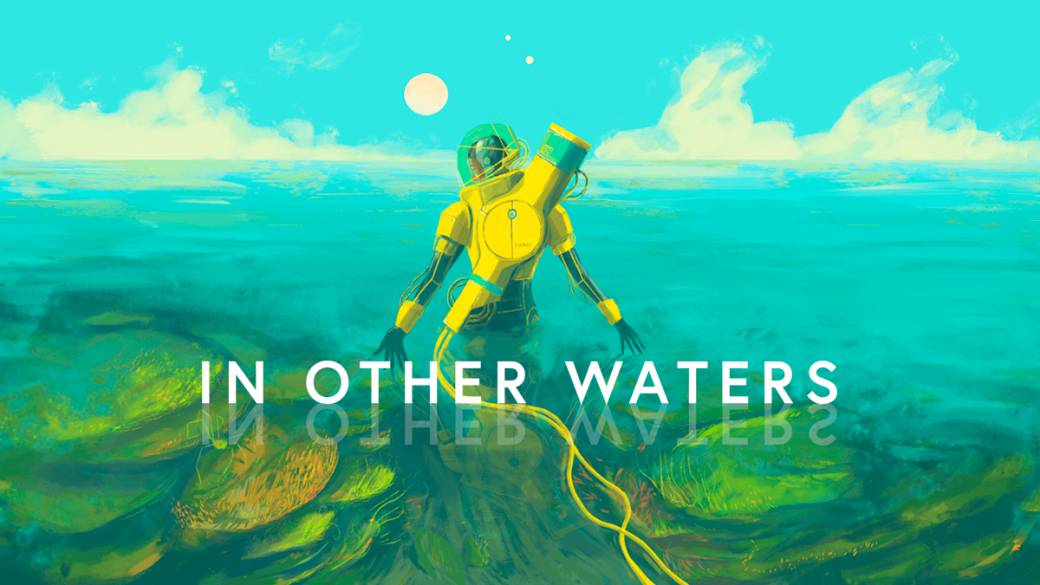
We dive into the waters of a world that is not ours, gradually discovering the mysteries of an unknown planet
There are not many games that base their premises on simple and pure exploration. It is difficult to resist the temptation to include some mechanics (combat, puzzles, management …) to earn the "right" to be called a video game, something that still creeps even once the genre slyly "walking simulator" is already well established and it has numerous examples of quality. In any case, and continuing with the initial idea, games that base their main column on pure and simple exploration are rare: reaching an unknown place, taking notes, observing … even games like No Man's Sky, which has a strong component of exploration, they do not resist adding some elements of combat and construction (precisely at the beginning it was accused of not having enough activities outside the exploration and scanning of flora and fauna).
If you are one of those who criticized that aspect in the title of Hello Games, or you simply are not too seduced by the idea of exploring, you can stop reading this review. In Other Waters is an adventure that combines narrative and exploration using a format more similar to that of a (sophisticated) interactive novel in which the main weight of the story and the description of the environments is done via text (in English, also quite technical by the use of numerous scientific terms). It is practically an interactive book with a more intuitive and elegant interface than plain text, but in which we follow a plot while exploring the infinity of the seas of an unknown world.
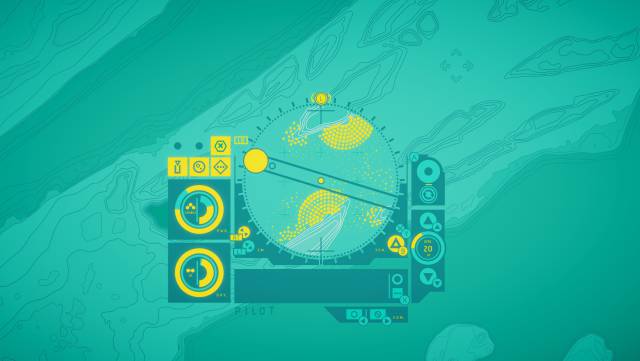
An elegant and efficient interface
In Other Waters is not a game that enters through the eyes, or at least not in the traditional way. The visual style is extremely minimalist, with only a topographic map and a series of icons as the only avenues of external and personal representation. The landscapes are described to us via text, with each step that we advance, so we will have to use our imagination to recreate the alien landscapes of Gliese 667C, an aquatic planet apparently without major significance but that hides an incredible secret for humanity.
The interface is in fact a small work of art in terms of presentation and use. It can be operated comfortably with the mouse and somewhat less comfortably but in a very functional way with the pad. The graphical representation of the radar, the map, and the various subsystems does a great job of being clear as well as obtusely futuristic and a bit incomprehensible at first glance. At the beginning we can get quite involved with the icons and the control in general, but with a little perseverance we will find clear the functions and what we have to do. The fundamental thing is the scanner (quick key in space) that will show us the points around us through which we can advance and if we have already visited them or not, it will also give us some additional keys such as whether the point contains samples that we can store. some aspects to keep in mind. It is a very limited game in interaction, but energy and oxygen must be managed on each trip, taking into account that there are environmental factors that can influence its consumption, but it is still a mechanism to accentuate dangerous situations, rather than a game mechanic that requires special attention.
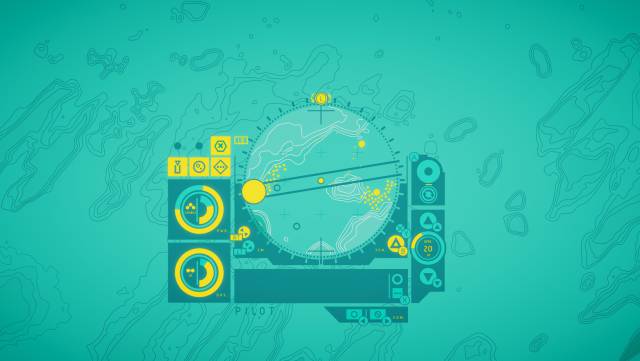
A surprising detail of In Other Waters is how evocative it is, how highly effective it is with so few audiovisual resources. The color palette is a delight, with a placid combination of yellow and turquoise that transports the atmosphere of the planet. There are no landscapes, but the combination of the topological map and the descriptions takes us to the strange landscapes bathed by the rays of light from outside. When we reach a point where the depths become greater and the map turns dark blue, it is easy to imagine the sensations of being in the vastness of an infinite ocean, as mysterious as it is terrifying. With subtle changes and a fantastic soundtrack, not very extensive but well used and executed, the game manages to influence our perception in an extremely effective way without using detailed graphic representations, convincingly appealing to our imagination.
Now, some graphic material with which to give some variety and context to our exploration, even if it were static, would not have hurt. The rate of advance of the exoskeleton that we control as its AI is quite slow and although each point has its small description, the game makes the mistake of deleting it as far as we advance, which forces us to either stop and read it before taking each step , making the advance even slower, or to jump directly. Considering also that there are times when we will navigate through a hostile environment that will undermine our resources, the result affects the only sensory resource that the game has. A greater integration of the sketches of the creatures that we found, and some more visual support in general, would not have gone bad.
Explore and follow the script
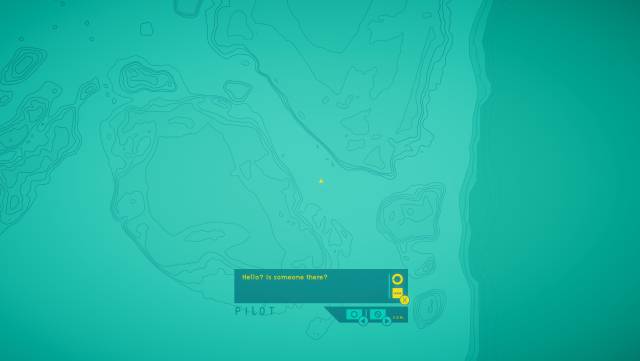
Given the limited movement, which is limited to straight lines between points, the truth is that In Other Waters offers few playable incentives. Collecting and observing flora and fauna is practically the only possible interaction, along with a few dual dialogue interactions with Ellery, the scientist we protect as the AI responsible for the exoskeleton that protects it in the deep. There are certain light puzzle elements, but so little elaborate that sometimes they are more tedious than stimulating. The ability of the game to maintain attention is based on what captivates the setting and how fascinating biology is, since it is clear that the game has been thought from a certain scientific knowledge base, demonstrating at all times that May your taste for technical notes. Ellery's story also has its charm, although there are times when it seems to us that with less exposure in its internal monologues, the game would have won.
The truth is that In Other Waters would have also won quite a lot if it had been possible or had time to extract lessons from a game that appeared last year called Nauticrawl 20000 Atmospheres, another modest indie production in which our only hope of escaping from the deep sea is a complex machine with which we have to interact as best we can. Both share being games that base their greatest strength on the graphical interface, with hardly any exposure to the outside world beyond the map we depend on to guide us, but Nauticrawl has a more marked game attitude, forcing the player to manipulate, hack or solve puzzles. more elaborate, which stimulates our mind and reflexes more. In Other Waters is certainly more relaxed, perhaps too much at times for its own sake, but it's clearly in the parameters that the game has been conceived.
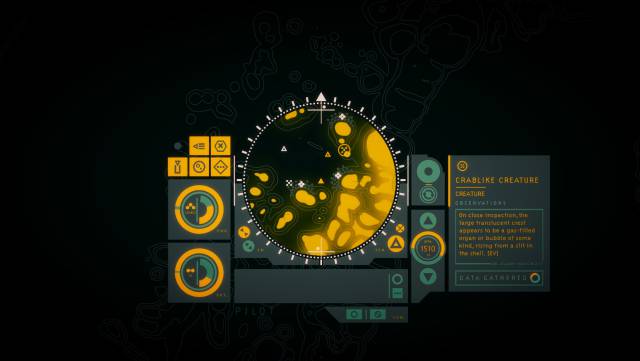
It is also a shame that an important part of the game is the book In Other Waters: A Study of Gliese 667Cc, a very striking element of the Kickstarter that shaped the project and gave it an original touch. The idea was to create a companion picture book to the game, with data, descriptions, drawings, and narrative elements, somewhat in the style of other conceptual-narrative art books such as those based on Tales from the Loop by Simon Stalenhag. Its position in history is somewhat strange, since it does both a prologue, a companion and an epilogue, so rather than enjoying yourself at the same time, it requires rather to finish the game first to recreate it. Its beautiful illustrations and the annotations that we can find do a lot to raise the general setting, but the price of € 8 will be an important barrier for many – which is not that it does not deserve it, the book is fantastic, but not everyone will understand that a part that elevates the experience so much is separated from such a minimalist game when it is already € 13. In this sense, the separation between the game and the book, its fit in the story and the way in which its set has been considered would surely have been better if it had been oriented differently, but it is a detail only, not something that affects the quality of the game.
CONCLUSION
In Other Waters is a game for a very small group of players. As an exploration title, the stimuli it provides are scarce; As interactive fiction, which is his main role, his text does not flow with the grace that it should be due to its tight mechanical movement. As a game, its mechanics are bland and lack of interest or interactivity. Still and surprisingly, the set works (with a good dose of patience) thanks to good aesthetic taste when it comes to planning all the elements, from the interface to the map, the soundtrack to the color palette. The story is warm, although a bit naughty and geared towards ecologists and lovers of biology in general, who will get the most out of it (as long as they don't have problems with English). Still, the aforementioned Nauticrawl is a better game and Sunless Skies is a better game and a better narrative experience, to mention two similar titles, something that should be weighed before cheering up your purchase for the current price.
THE BEST
- Great interface
- Excellent visual design and color palette
- A good (albeit sparse) soundtrack
- How evocative it can be with so little
WORST
- Movement mechanics make narrative rhythm difficult
- Interaction can be tiring and uninspiring
- Lack of visual support present in the companion book
Right
It is not the latest or most original, nor does it have the best execution, but it can be fun if you like the genre. Good, but upgradeable.
